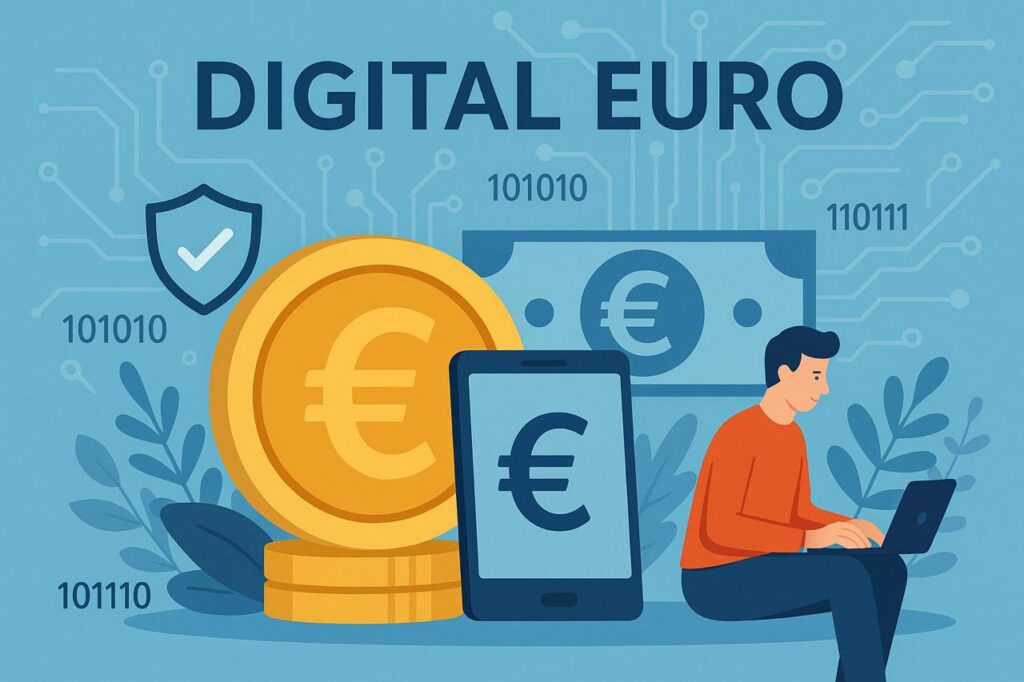The ECB is about to launch something that could either liberate European payments forever—or give governments unprecedented control over every cent you spend and 95% of Europeans have no idea what it means for their financial future.
Picture this: It’s 2027. You walk into a coffee shop in Berlin, but your digital euro wallet is mysteriously temporarily restricted because an algorithm flagged your recent purchases as unusual spending patterns. You can’t buy coffee. You can’t pay for lunch. You can’t even tip the barista because every transaction now flows through a system that knows more about your life than your closest friends.
Sounds like dystopian fiction? It’s not. It’s one possible future of the digital euro.
Let’s start with the dream scenario, because it is genuinely compelling. The European Central Bank isn’t building the digital euro to spy on your morning latte purchases. They’re trying to solve real problems that affect millions of Europeans every day.
Instant, Free Cross-Border Payments
Today, sending €100 from Madrid to Milan can cost you up to €15 and take up to three days. With a digital euro, that same transaction could be instant and free. No more waiting for settlements and transfers.
Across Europe, millions of people still lack access to basic banking services. A digital euro could change that overnight. All you would need is a smartphone—no credit checks, no minimum balances, no monthly fees. It’s digital cash that works for everyone.
Right now, we’re sleepwalking into a future where Apple Pay, Google Pay, and Amazon control how we spend money. The digital euro could be Europe’s answer to this as a public alternative.

Economic Sovereignty in a Multipolar World
When China launches its digital yuan globally and the US dominates with the dollar, Europe risks becoming a financial backwater. The digital euro isn’t just about payments, it’s about ensuring European values and European interests shape the future of money.
In this utopian vision, the digital euro becomes the great equalizer: faster than anything, more private than apps, more inclusive than banks, and more sovereign than foreign-controlled payment systems.
The Nightmare: A Surveillance State’s Dream. But, here’s where the story takes a dark turn. Because the same technology that could liberate European payments could also create the most sophisticated financial surveillance system in human history.
Every Transaction Tracked and Analyzed
Unlike cash, which disappears into anonymity the moment it leaves your wallet, every digital euro transaction creates a permanent, searchable record. The ECB promises privacy, but their definition of privacy is – in a lack of a better word – flexible. They’ll know when you buy, what you buy, where you buy it, and how often. They’ll know your habits, your preferences, your weaknesses.
Programmable Money, Programmable Control
Here’s the truly terrifying part: digital euros can be programmed. Governments could set expiration dates on your money, forcing you to spend it or lose it. They could restrict what you can buy. No alcohol, no cigarettes, no political donations to parties they don’t like. They could implement negative interest rates that literally steal money from your wallet if you save too much.
The Ultimate Social Credit System
China’s social credit system tracks citizen behavior and restricts access to services based on trustworthiness. With a digital euro, European governments could implement something similar overnight. Late on your taxes? Your spending is capped. Attended a protest? Your money is frozen. Posted something controversial online? Your digital wallet is under review.
The ECB is so worried about digital euros causing bank runs that they’re planning to cap individual holdings at €3,000 to €4,000. But what happens during the next financial crisis when everyone tries to convert their bank deposits to digital euros simultaneously? The caps become meaningless, banks collapse, and the entire financial system implodes.
The Uncomfortable Truth: Both Futures Are Possible
The most unsettling aspect of the digital euro debate isn’t that one side is right and the other is wrong. It’s that both visions could come true simultaneously.
We could get instant, cheap payments – and – lose financial privacy. We could achieve financial inclusion – and – create new forms of exclusion. We could gain monetary sovereignty – and – surrender individual autonomy.
The Design Choices That Will Determine Our Fate
The difference between utopia and dystopia lies in the technical details that most people will never understand:
- Privacy by design vs. surveillance by default
- Offline functionality vs. always-connected tracking
- Open source code vs. black box algorithms
- Democratic oversight vs. technocratic control
- Gradual rollout vs. forced adoption
Right now, these crucial design choices are being shaped in technical committees and policy meetings, but their success ultimately depends on public understanding and acceptance. The people who will actually use this money—all of us—need to be active participants in this conversation.
The Missing Voices in the Room
Here’s what’s truly alarming: across Europe, there’s been virtually no public debate about the digital euro. No referendums. No citizen assemblies. No prime-time television debates. The most significant monetary innovation since the creation of the euro itself is being developed through technical and policy processes that need broader public engagement and understanding to ensure it truly serves everyone’s needs.
Meanwhile, the clock is ticking. The ECB is accelerating development, with pilot programs already underway and a potential launch within the next few years. Once the system is built and deployed, changing it will be nearly impossible.
What Happens Next? The digital euro is coming whether we like it or not. The question isn’t whether it will be introduced, but what form it will take. And that depends on whether European citizens wake up and demand a voice in shaping their financial future.
The Optimistic Scenario
If we act now, we could still influence the design. We could demand strong privacy protections, offline functionality, and democratic oversight. We could ensure the digital euro serves citizens, not surveillance states. We could create a model that other countries follow, spreading European values of privacy and freedom globally.
The Pessimistic Scenario
If we don’t engage now, we risk missing the chance to influence how the digital euro balances competing priorities—from privacy and security to innovation and accessibility. This is precisely why broad public input is so vital to getting it right.
The Choice Is Ours (For Now)
The digital euro represents the most significant shift in monetary policy since the abandonment of the gold standard. It will reshape how we think about money, privacy, and the relationship between citizens and states.
We can have a digital euro that empowers individuals and strengthens democracy. Or we can have one that enables surveillance and control. We can’t have both.
The choice is still ours to make. But not for much longer.
The question isn’t whether you trust the European Central Bank with your financial data. The question is whether you trust every future European government, every future ECB president, and every future crisis to use that power responsibly. Because once it’s given, we’re never getting it back.
What kind of digital euro do you want? That’s one of the reasons we at Money Motion are doing what we are doing. We’ve been having this conversation since our very first edition, when the Croatian National Bank’s vice governor Sandra Švaljek put the digital euro on our stage before most people even knew it was coming. We’ll keep pushing this debate forward, creating the space where policymakers, innovators, and citizens can shape this together. Because the future of money is too important to be decided without you.
That’s why we’re here. That’s why this matters. And that’s why we need you to be part of this conversation.





